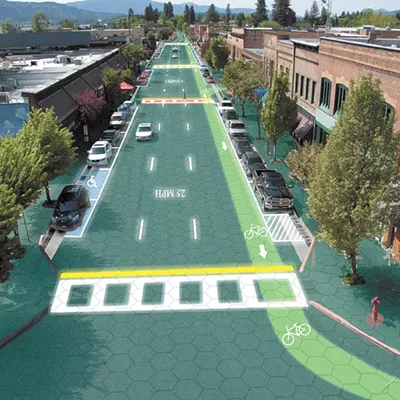
The sun has never been more powerful. The glut of overbuilt Chinese solar panel factories, state and federal subsidies and innovative financing schemes mean the solar panel industry has absolutely exploded. Solar power is cheaper and sleeker than ever, opening whole new environmental possibilities. "Microgrids" of solar power on islands could replace costly, carbon-belching diesel generators. But solar power still has some weaknesses, like, say, clouds.
"A cloud goes over, all of a sudden the solar goes away," says Erick Petersen, spokesman for Demand Energy, a growing startup in Liberty Lake. "You have this intermittent resource that's very hard to predict."
That's where battery power comes in. When the sun's beaming down, a solar panel sends excess electricity to an energy storage battery. So when the sun sets, or ducks behind a cloud, the battery takes over, smoothing out the dips and spikes that make solar power unreliable. Same with wind farms. In many areas of the country, the wind blows the hardest between 10 pm and 4 am — not exactly the time when people are using the most power. Energy storage systems make them far more practical.
Engineers and chemists have been scrambling to design better and better batteries, solar panels and wind farms. Demand Energy isn't focusing on the hardware. It's all about the software.
"We're putting a virtual power plant into the basement of a building," Petersen says. This technology, installed in commercial and industrial companies, can track those spikes and dips. It can calculate the seasons and times of the day when power is in lowest demand, charge up the battery and save it for the high-demand times.
Doug Staker, former international business chairman with smart-meter creator Itron, helped launch the company six years ago. "We're pioneers in helping to create the energy grid of the future," he says.
Being a pioneer comes with a lot of risks. In October of 2013, the company ran out of money, went into receivership and had to reboot entirely. It recently paid off its debts, found new investors and is now heading into a more favorable market.
Last year, Morgan Stanley came out with a report predicting what's become known as the "utility death spiral." Companies and factories will begin adding their own tiny power stations, using solar power and other forms of renewable energy, and be able to survive largely off the grid. Ultimately, power will be far cheaper and more efficient — with no big loss from electricity traveling across hundreds of miles of power lines — while big, traditional utility plants would become increasingly obsolete.
Companies like Demand Energy are already reaping the results from the shifting industry. "The market in a year has changed and grown more than it has in the previous six," Petersen says.
The demand for innovation is especially stark in dense, power-hungry markets like New York, where Demand Energy has focused much of its efforts. After all, other than just a fee charged on their power consumption, businesses face heavy additional charges based on how fast the company burns through power. A company that crams all of its power usage into one hour is charged considerably more than one that's able to spread its power usage throughout the day.
The spikes are bad for the environment, too: To meet demand during peak hours, power plant facilities have to flip on an extra power plant. "Basically a jet engine connected to a generator," Staker says. "It's almost double the amount of energy you've got to use to create the same unit of electricity."
Solve the peaks-and-valleys problem, like Demand Energy is trying to do, and solve that problem as well. Its software can adapt, tracking the rise and fall of power usage over time, using historical data to increase the system's efficiency even further. It also keeps tabs on battery temperature — crucial to avoid damaging it.
"You've heard the words 'big data' and 'analytics'?" Petersen says. "That's the heart of what we're doing."
Ideally, the environmental impact goes beyond just wind or solar. A company in New York may have a garage where a fleet of electric vehicles get plugged in, all recharging at roughly the same time. Demand Energy's software, Staker says, can help them save money, making the electric vehicle fleet more practical.
"We're looking at new adopters, not just early adopters," Staker says. "We have really been evangelists for the market." ♦



















